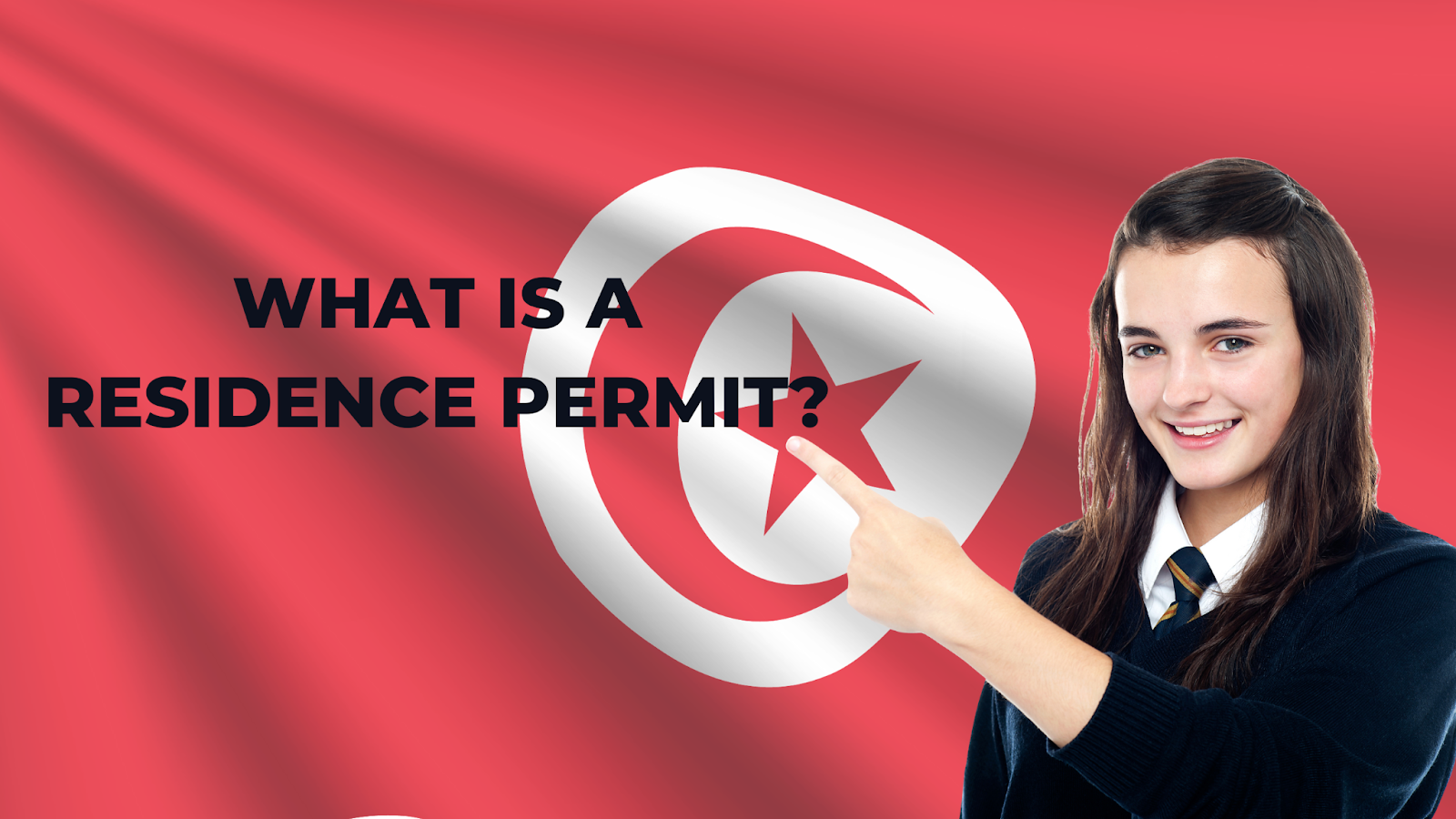Tunisia, a captivating Mediterranean gem, beckons with its warm sun, rich culture, and delectable cuisine. Whether you're drawn to this North African nation for work, business, language learning, or to embrace its vibrant culture, the idea of living in Tunisia is undoubtedly exciting.

However, before you pack your bags and embark on your journey, there are certain formalities to navigate. One essential step for long-term living in Tunisia is obtaining a residence permit. In this blog, we'll guide you through the process, requirements, and offer some tips for a smoother transition to your new home.
Tunisia's immigration laws have seen limited changes in recent decades and are known for their restrictive nature. Work permits are granted to foreigners in Tunisia only when there is a genuine shortage of Tunisian workers with the required expertise in a specific field.
Foreigners seeking paid employment in Tunisia must acquire a work contract with a Tunisian employer and hold a residence card indicating they are "allowed to exercise a remunerated activity in Tunisia."
Both of these documents are compulsory, and failure to comply can result in severe consequences for both the employer and the foreign worker, including fines, deportation, and even criminal charges.
The work contract between a Tunisian employer and a foreign worker must be approved by the Ministry of Employment. Approval is granted if the Ministry is satisfied that there is a lack of qualified Tunisian candidates for the position in question.
However, some categories of foreign workers are exempt from this requirement and can work in Tunisia after submitting a simple declaration to the competent services of the Ministry of Employment.
This declaration grants the foreign worker a certificate of 'non-submission to a work contract' with the same legal force as an approved work contract.
Foreign workers in Tunisia are entitled to the same rights and are subject to the same obligations as Tunisian workers. All employers and foreign workers must strictly adhere to the legal requirements when hiring foreign staff.
Once the work contract is approved (or the certificate of non-submission is obtained), the foreign worker can apply for a residence card.
During the application process, the applicant will receive a temporary residence card, allowing them to leave and re-enter Tunisia until the final document is issued.
The Finance Law 2023 has introduced a new requirement for foreign tax residents working in Tunisia, mandating the justification of their tax situation concerning overdue taxes at the time of renewing a residence permit, following international treaties and special agreements.
Work visa requirements in Tunisia may vary depending on factors like the applicant's country of residence and the intended length of stay.
A work visa is generally long-term, granting entry to Tunisia. Upon arrival, the foreign worker must apply for a residence and work permit at the nearest police station. Typical documents needed for a work visa application include:
In addition to these employee requirements, the employer must demonstrate the unavailability of suitable Tunisian candidates for the job.
Tunisia provides both public and private job search assistance services. Public services are primarily aimed at Tunisians, so foreigners may find it more beneficial to contact private agencies. Some relevant services and resources include:
Public Services:
Private Services:
Always check the reputation and reliability of these agencies with the Ministry of Training and Employment.
Tunisia offers support for self-employed individuals through various public, private, and civil society organizations, including:
A residence permit is your ticket to residing in a foreign country for an extended period, be it temporary or permanent. While it doesn't grant citizenship, it does provide more privileges than a standard Tunisia tourist visa. Each country has its rules and regulations for obtaining a residence permit, and Tunisia is no exception. Whether you're planning to work, study, or invest in Tunisia, understanding the residence permit process is crucial.

Before diving into residence permits, let's exploreTunisia visa policy. Depending on your nationality and the purpose of your visit, you might not even need a residence permit. Nationals of around 97 countries can enjoy Tunisia for up to 90 days without a visa. German and Canadian citizens can stay for four months, while Bulgarians have a two-month limit.
For some travelers, a standard tourist visa or even an ID card and a hotel reservation might suffice. It's essential to determine your intended duration of stay and whether it exceeds the standard visa allowance.
The application process for obtaining a residence permit in Tunisia is relatively straightforward. If you are seeking a temporary residence permit, you will receive a temporary residence visa from your embassy before departure or apply at the nearest police station upon arrival in Tunisia. The application involves completing the necessary forms, submitting required documents, and receiving information about the subsequent steps.
For those pursuing permanent residence, the process is similar, but you will need different documentation to demonstrate your eligibility. While the application process itself is not overly complex, it is often time-consuming and may involve bureaucratic procedures inherited from the country's colonial history.
Investor-Friendly Tunisia
Tunisia encourages foreign investment and offers the opportunity to obtain a residence permit in exchange for an investment. The Investor Support Department at the Ministry of Foreign Investment assists foreign investors and entrepreneurs in this process. Documents required for a residence permit application include:
For more information, visit the Tunisian investment website.
Foreigners can obtain a residence permit by purchasing real estate in Tunisia. Specific requirements and documents may vary, so consult the appropriate embassy or consulate for more information.
Tunisia offers permanent residence visas in two categories:
The renewal of a residence permit in Tunisia typically requires the submission of the following documents:
The cost for applying for permanent residence is 150 Tunisian dinars (75 dinars for students and students).
Family reunification is possible if you are married to a Tunisian citizen or have children who are Tunisian citizens. This can lead to obtaining a permanent residence visa. Requirements may include:
The specific documents may vary by country and embassy.
Tunisian citizenship is generally acquired through jus sanguinis (by birth) or by naturalization for permanent residents.
Naturalization candidates must meet specific criteria, including an understanding of Arabic, Tunisian customs and traditions, integration into society, good character and morals, a clean criminal record, and no mental or physical health issues that could make them dependent on the state. Naturalization is usually granted after five years of continuous residence in the country.
For individuals with family ties to Tunisian citizens or in cases where citizenship renunciation is not required for marriage, the residence requirement is less than five years. Simplified naturalization can occur in two years for those not required to renounce their original citizenship.
The Tunisian President makes the final decision regarding naturalization requests, with the option to grant, reject, or postpone consideration. Silence from authorities for one month after application submission is equivalent to a refusal.
A residence permit in Tunisia is an official document that allows foreign nationals to live in the country for an extended period, either temporarily or permanently. It provides certain rights and privileges, similar to a visa but for a longer duration.
If you plan to stay in Tunisia for an extended period, beyond the standard visa duration, you will likely need a residence permit. However, for shorter stays, a standard tourist visa may suffice.
There are two main types of residence permits in Tunisia: temporary and permanent. Temporary permits are usually valid for one to two years and are granted for purposes like work, study, family reunification, or investment. Permanent permits are available under specific conditions, such as long-term residence, marriage to a Tunisian citizen, having Tunisian children, or making a significant contribution to the country.
The processing time for a residence permit in Tunisia can vary depending on your specific situation, the completeness of your application, and the local bureaucracy. It's advisable to start the process well in advance of your planned move.
Common requirements include a valid visa (temporary residence or tourist visa), a completed and signed application form, a valid passport and copies, and documents that justify your need for an extended stay. These documents can include a marriage certificate, employment contract, proof of investment, and more.
The application process involves submitting the required documents to the appropriate authorities in Tunisia. For temporary permits, you can apply at the nearest police station or immigration office. For permanent permits, the Directorate General of National Security in the Ministry of the Interior typically handles the application.
Yes, there are fees associated with obtaining a residence permit in Tunisia. The exact amount can vary depending on your circumstances. You will be informed of the fees as you progress through the application process.
To help us improve